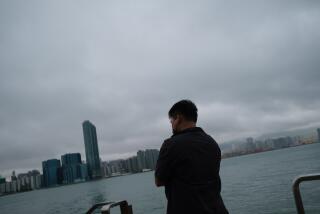Hong Kong Boat People Hit Hurd, Repatriation Policy
- Share via
HONG KONG — Chanting and banner-waving Vietnamese boat people confronted British Foreign Secretary Douglas Hurd during his visit to a refugee camp today, condemning London’s policy of forced repatriation of asylum seekers.
More than 1,000 Vietnamese at the Hei Ling Chau camp shouted anti-repatriation slogans and waved clenched fists during Hurd’s visit, protesting the policy that sent 51 boat people back to Hanoi last month in a secretive, pre-dawn roundup.
While boat people in the camp chanted and marched, Hurd, on the final day of his four-day visit to the British colony, toured screening facilities used to separate some of Hong Kong’s 56,000 boat people into two categories--political refugees or economic migrants.
Only genuine political refugees are eligible for resettlement in the West. The rest--an estimated 90% of those in the camps--face return to their homeland or years in Hong Kong’s squalid detention centers.
Hurd arrived in Hong Kong on Saturday in a bid to restore public confidence shaken by China’s bloody June crackdown on pro-democracy demonstrators in Beijing and to see first-hand the huge refugee problem faced by the already crowded territory.
Hong Kong is due to be returned to Chinese rule in 1997 at the expiration of Britain’s 99-year lease on the colony, but tens of thousands of the colony’s 5.7 million people have emigrated due to fears of Beijing’s takeover.
At a news conference before leaving the colony, Hurd told reporters that repatriation--voluntary or forced--is the only way to stop the mass outpouring of Vietnamese into the South China Sea.
He said Britain will continue forced repatriations in hopes of deterring would-be boat people from leaving Vietnam but gave no schedule for a second group.
Hurd said he hopes that nations that have criticized the forced return of boat people will take a more practical stance on the policy during a U.N. meeting on refugees in Geneva this month.
More to Read
Sign up for Essential California
The most important California stories and recommendations in your inbox every morning.
You may occasionally receive promotional content from the Los Angeles Times.










